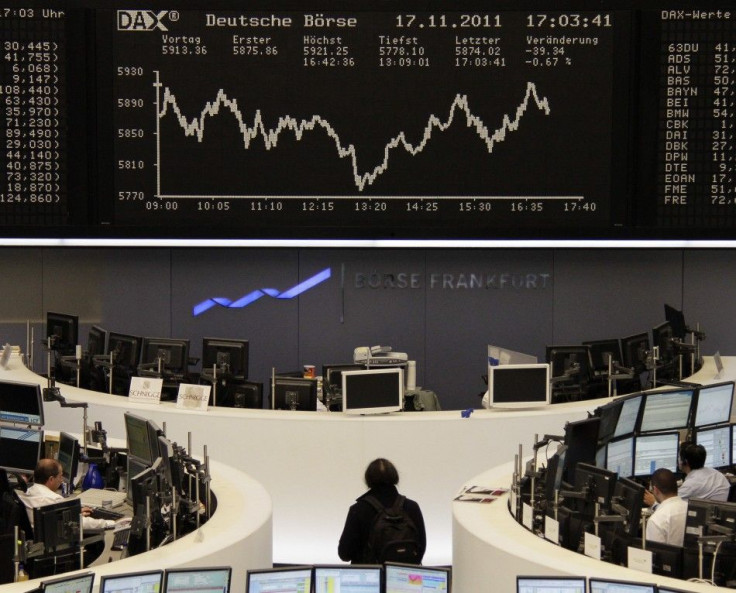Europe's Markets Close Higher Thursday on U.S. Data

(REUTERS) -- European shares advanced on Thursday as upbeat data from the United States helped fuel a low-volume rally in the afternoon, although volatility also rose as investors hedged against lingering uncertainty in the Eurozone.
The Chicago PMI, a measure of financial activity and gauge of U.S. business conditions, beat estimates, and pending home sales rose by much more than expected in November.
While the readings point to improvement in the U.S. economic environment, which would support European corporate earnings, continued high borrowing costs at an earlier auction of Italian debt showed the market remains sceptical on a solution to the euro zone debt crisis.
On Thursday, London's FTSE 100 closed up 59 points to 5,567, Germany's DAX closed up 78 points to 5,849 and France's CAC 40 closed up 56 points to 3,128.
The FTSEurofirst 300 index of top European shares closed up 1 percent at 992.78 points, although trading was once again light at one-third of its 90-day average.
However, the Euro Stoxx volatility index, based on sell- and buy-options on the Euro STOXX 50 and which traditionally has an inverse correlation with the index, rose 1.2 percent as investors took protection against a possible escalation in the euro crisis at the start of next year, when the sovereign and corporate refinancing cycle is set to resume.
There is so much political and non-market risk in the first quarter of next year that people are still happy to buy option volatility at this level, even though the market has been better, Andy Ash, head of sales at Monument Securities, said.
I think the market feels it can continue to have a bit of an end-of-year squeeze (but) you can't trust anything on a day like today because there is just no volume.
In a sign the underlying sentiment is still one of caution, defensive sectors such as utilities and telecoms were among the top performers, rising 1.5 percent and 1.3 percent respectively, as investors preferred yield plays to stocks heavily dependent on the economic cycle, such as personal & household goods, which rose by a mere 0.5 percent.
Italian banks, which own the bulk of the country's debt, mostly underperformed after Italy saw the yield on its 10-year notes remain perilously close to 7 percent, a level seen as unstustainable in the long run, at an auction on Thursday.
UniCredit fell 1.5 percent as uncertainty over the pricing of the bank's capital increase added to sovereign-related risk.
The Italian lender is one of many European banks undertaking capital injections to comply with stricter requirements imposed by European regulators, a situation that, according to some analysts, could exacerbate the fragility of funding markets.
These concerns were underpinned by data from the European Central Bank showing loans to private sector firms in the euro zone fell in November, while growth in lending to households slowed.
Today's significant decline in money and credit growth stresses the need to carefully monitor the situation in the banking sector and the risks to economic growth, said Loredana Federico, an economist at UniCredit Research.
She added that she expects moderate deceleration in the pace of monetary and credit expansion over the coming months.
--
© Copyright Thomson Reuters 2024. All rights reserved.





















